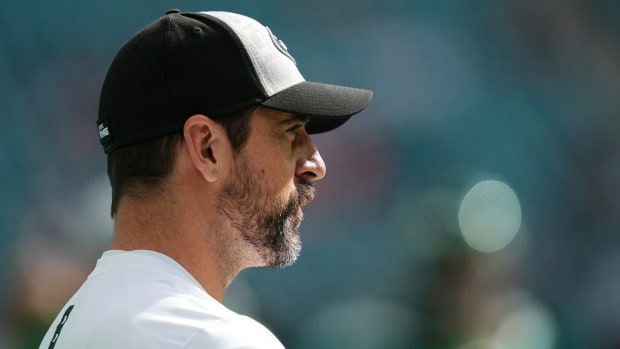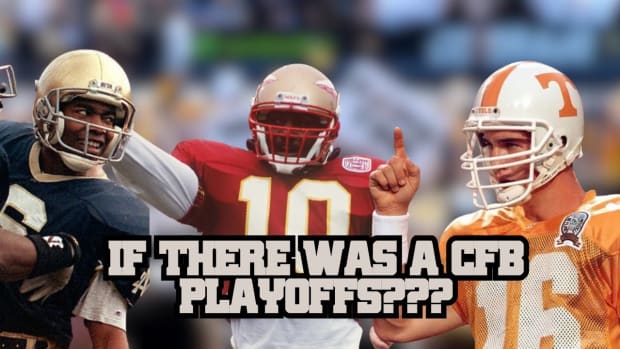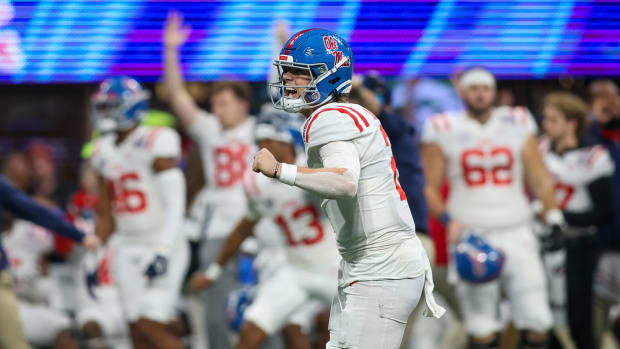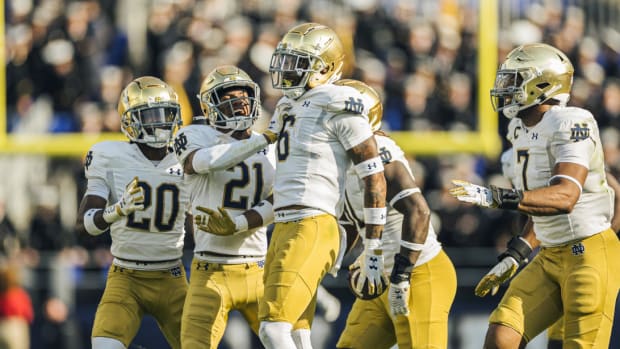Is Les Miles Ready for the Hardest Job in College Football?
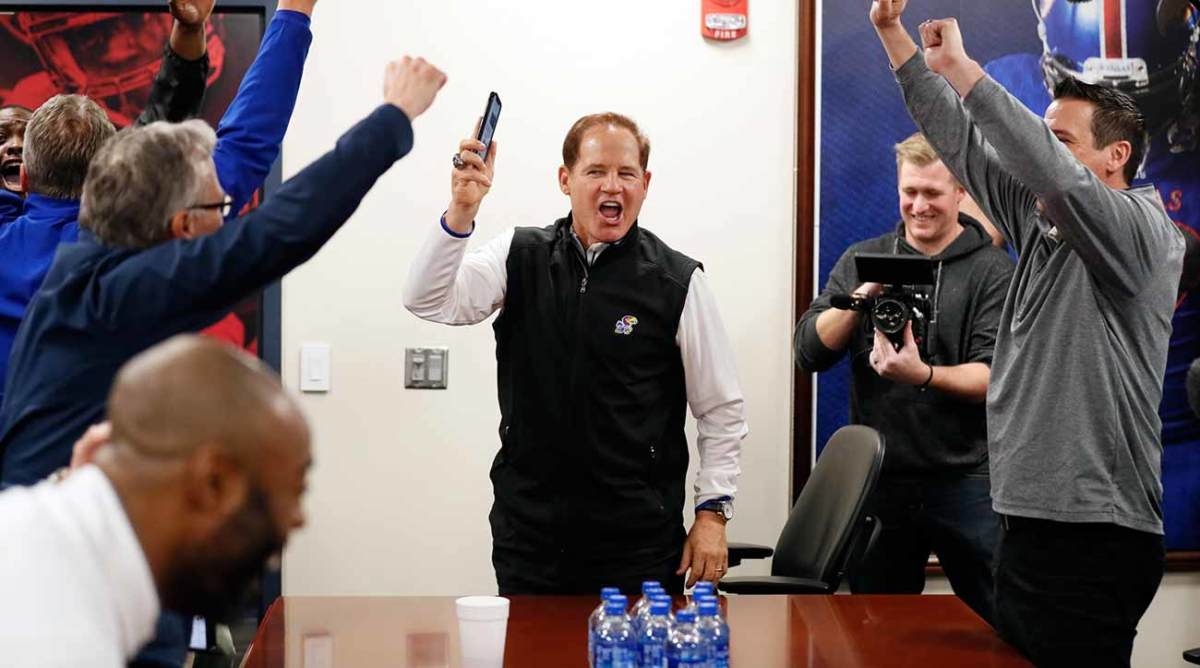
LAWRENCE, Kansas – Sliced avocado, mixed greens, walnuts, grapes, dried cranberries, tomatoes, cucumbers and red onions. These ingredients are gathered in a bowl, tossed in a rice wine vinaigrette and, on this cold night at 23rd Street Brewery, placed in front of Kathy Miles. “I love the dressing,” she tells restaurant owner Matt Llewellyn. This meatless salad is a new menu item at this Lawrence restaurant, and it is selling well, Llewellyn says, mainly because most patrons add protein, raising the price from $10.99 to $13.99. Weeks ago, Kathy’s husband, the new Kansas head football coach, walked into this place for the first time and, after scouring the menu, created his own dish. “Here’s what I want,” he told Llewellyn, and with that, the Les Miles Vegan Salad was born.
You have reached your limit of 4 premium articles
Register your email to get 1 more
Les Miles has a new diet. He has a new job, having been fired from an SEC football powerhouse only to land at a Big 12 basketball school. He also has a new mannerism: He no longer publicly utters the three letters inscribed on the national championship ring he brandishes on his right hand, instead referring to LSU as “my last stop” or “the place I was last”. Miles, now 65, is about 20 pounds lighter than you last saw him on the sideline, and for the first time in his life, he is regularly wearing his most hated color, a red that is a few shades away from the ones worn by his career archrivals Alabama (as head coach at LSU) and Ohio State (as a player and assistant at Michigan).
But the new Kansas coach is still quirky old Les Miles, the guy who during his two years out of football starred in beer commercials and appeared in two feature films; the guy who produced hilariously perplexing press conference soundbites by butchering the English language; the guy who chewed on grass in tense sideline moments and wore his white hat so oddly atop his head that he earned the nickname “the Mad Hatter”, which dovetailed with his penchant for fourth-down risks and fake field goals. He scaled a downtown Baton Rouge building, kissed a pig at an annual on-campus event and, during news conferences, did everything from answering a reporter’s ringing cellphone to saluting Columbus Day. A retired Miles had the makings of Dos Equis’s next “most interesting man in the world” or the replacement for Lee Corso as the comedic star of ESPN's College GameDay.
Miles had other plans, namely to return to the football field, where he last captained LSU for 12 years, claiming two SEC championships and a national title and exiting with the best winning percentage of any coach in the program’s modern era. His legacy there remains complicated. Four games into the 2016 season, with a fan base and administration exhausted by an offense stuck in the stone age, Miles was fired, too stubborn to change philosophies. Now he’s back, forgoing $5 million left on his LSU buyout to lead a program that hasn’t reached a bowl game since 2008. Why? “I think retirement is not something I was fired up about,” he says. “I’m having fun.”
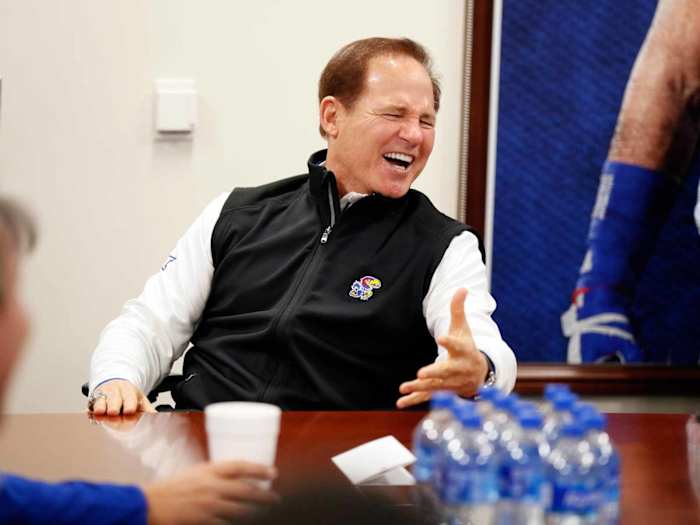
After two seasons away from the sidelines, Miles was brought in by his longtime friend, new Kansas AD Jeff Long, to turn the Jayhawks around.
David E. Klutho
The new Les Miles has a new ride, a black Cadillac Escalade, with a private parking spot that hugs Memorial Stadium and allows access to a rear entrance of the football complex. It’s cold out, spitting snow, and within seconds, the vehicle’s front window begins to fog. As he slowly rolls down a paved driveway, Miles points to a nearby hill. One night, he watched a student ride a sled down the snow-covered embankment, skid across the asphalt roadway and slam into the black iron gate that encircles the football stadium. “He picked up his stuff,” Miles laughs, “and ran.”
Everything's different here—the weather, the culture, the people. In the middle of National Signing Day, Kansas had to close campus because of an impending ice storm. Good luck finding boiled crawfish or jambalaya here, and there’s no week-long Mardi Gras break. And the people? The people like basketball. Kansas brought in just under $4 million in football ticket revenue in 2018, while men’s basketball made roughly $15.9 million, according to a recent Kansas City Star story. “Football is year-round in the SEC,” says Katy Lonergan, Kansas’s director of football communications and a Jayhawks alum who spent seven years in a similar role at Ole Miss. “That’s basketball here.”
Athletic director Jeff Long wants to change that—not basketball’s success, but football's failures. Long hired longtime football administrator Mike Vollmar to oversee football directly in a created position, and he approved the addition of 12 support staff members and increased the overall salary pool. A $26 million indoor football facility will open just in time for spring drills, and the university erected new athlete dorms over the last two years. “We’re not doing this at the expense of our basketball program,” Long says. “It’s in addition to. We need both of them.”
Back in his Escalade, Miles is receiving directions—and not following them very well—from backseat driver Zac Woodfin, Kansas’s director of strength and conditioning. During one drive across campus on signing day eve, Miles plows through a stop sign, cuts in front of a pedestrian and nearly goes out of turn at a four-way stop, triggering the other driver, who raises his hands in fury, clearly oblivious to the identity of the traffic perpetrator. “I’m not going to hurt you! Go!” the coach cries through the windshield. Later on, Kathy Miles whispers about her husband, “He drives like his dad.” There’s a story here, Les says. While growing up in Cincinnati, Miles’s father taught him to drive at age 13. Hope Miles sat in the passenger seat of his Chevy Impala, handed his son the keys and told him, “If you don’t drive 50 miles an hour, you’re wasting my time.”
Miles keeps it under 50, thankfully, and everyone makes it to the destination: the old Kansas indoor facility, where Miles’s team will soon begin training. This is a site inspection before workouts begin. As Miles walks into the back door, he bumps into a group of Kansas pole vaulters in the middle of practice. With stunned expressions, they stop everything, and Miles gathers them into a semi-circle, an entertainer about to enthrall with another act, this one a three-minute tale about his short-lived days as a high school shot putter. The story culminates with a teenage Miles, full of confidence, lurching the shot put into the air for his first big throw. “Clunk,” he says. The shot put traveled about five feet. The pole vaulters burst into laughter, and Miles waves goodbye, leaving in his wake another satisfied audience.
During his two years away from coaching, Miles took acting lessons and auditioned for movie roles, part of what he thought might be a new career. He’s appeared in four films, most recently playing a NASA official in The Challenger Disaster, a drama chronicling the Challenger space shuttle explosion. He’s brought his made-for-TV productions to his new team. At one point during signing day, Kansas coaches would gather in the staff meeting room to recreate a celebration video for social media purposes. Like many signing day scenes, it’s all an act. Defensive coordinator D.J. Eliot, phone in hand, rushes into the room, hands a phone to Miles and yells, “Look, Coach, what I just received!” Miles loudly announces to the room the newest signee, pumping his fist in celebration. By the end of it, the entire room is roaring with laughter. “So that’s what you two do up here so late together,” one assistant jokes. “Coach is teaching D.J. acting!”
With the indoor facility visit complete, Miles drives back to his office. On the way, he passes Allen Fieldhouse, a historic venue with areputation for intimidating visitors, a hoops analog of LSU’s Tiger Stadium. Along the side of Allen Fieldhouse is a practice gymnasium that encompasses a court 1.5 times larger than normal. Connecting the two buildings is an elegant VIP area, illuminated by skylights and reserved for boosters during games. Across campus, next to Kansas’s football complex, are two artificial turf practice fields. The fields don’t have lights.
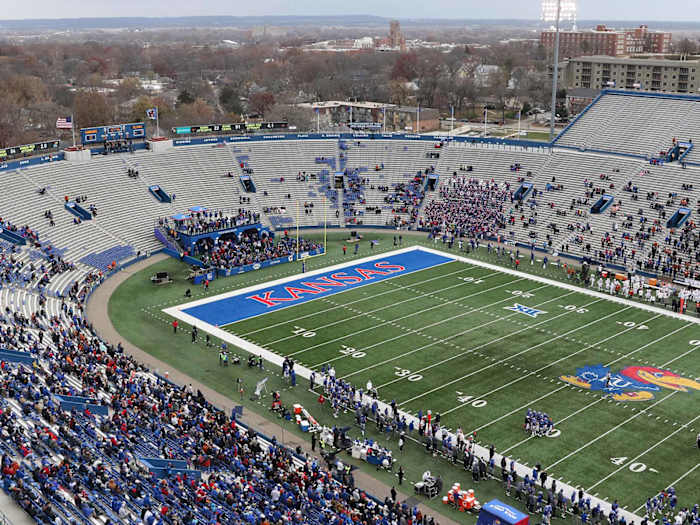
Kansas drew an average of less than 20,000 fans to Memorial Stadium in David Beaty's final season.
Scott Winters/Icon Sportswire via Getty Images
Two of Miles’s assistants are waiting for the coach as he arrives at his office at 7:15 a.m. on National Signing Day morning. In an unmistakably grave tone, one of the men tells Miles the bad news: “Marcus Harris’s mom called.”
Harris is a three-star defensive end from Alabama who had told coaches the day before that he planned to shun local offers from schools like South Alabama, Southern Miss and Tulane to sign with Kansas. Now he’s having cold feet, and so is his family. What happens next speaks to the recruiting power of Miles, a key reason Long brought him here. He’s charming and comforting in front of fans and families, with a disarming, goofy personality. Tight ends coach Jeff Hecklinski witnessed it this winter during in-home visits as Miles, surrounded by recruits’ family members, put everyone at ease and then flaunted his national championship ring. “It gets passed around,” Hecklinski says with a laugh. The jewelry is far from the only selling point. Miles lasted more than twice as long as the average head coach in the SEC. “We use that,” Eliot says. “He’s got to be a great coach to go 12 years in the SEC.”
Miles hurriedly gets on the phone with Harris’s mother, settles the family’s nerves and gets his reward later that morning when Harris’s paperwork arrives. Defensive line coach Kwahn Drake bellows a “Booooom!” across the hallways of the football complex, and Miles emerges from his office. “Marcus is in?” he asks. Marcus is in, he’s told. The excitement over landing the 247Sports Composite’s 120th-ranked strong-side defensive end, who held one other Power 5 offer, is one of the biggest celebrations of the day, an indicator of the situation Miles inherits.
Kansas is considered by many to be the worst major-conference program in college football. Miles has more wins in 16 seasons as a head coach (141) than Kansas does in its last 33 seasons of football (137). The Jayhawks have finished with a losing record in 10 consecutive seasons, winning six conference games over that span, and averaged 19,424 fans at their home games in 2018.
None of this mentions the most troublesome issue, a grim roster outlook laid out by the new staff's in-house evaluation: Kansas won’t be able to fill its allotment of 85 scholarships until 2022 at the very earliest, thanks to attrition, the shortsighted recruiting tactics of past regimes and the NCAA’s two-year-old 25-scholarship limit for each signing class. Hecklinski spent two weeks while over Christmas break creating a comprehensive roster analysis, organized in a thick, three-ring binder that sits atop his desk. “I kept looking at it like, this can’t be right,” says Hecklinski. “Toughest roster situation I’ve seen.”
Over the next three seasons, the Jayhawks will operate in a 10-player hole and likely far more. Those who transfer, get injured or are dismissed cannot be easily replaced. The impact on the 2019 signing class was significant. Miles and staff were limited to signing 15 players this year, as 10 spots were filled by blueshirted prospects who joined the team last year under the previous regime. Blueshirting, the act of awarding scholarships in August to unrecruited players, is a maneuver to exceed the NCAA’s annual scholarship limit by borrowing spots from the following year’s class, a move that often reeks of desperation. Miles downplays the roster situation, while also revealing a jarring truth: He only learned the extent of the problem after he was hired. “There’s a clear path in getting back,” Miles says. “It’s just going to take time.”
STAPLES: Why Shirt Color Matters So Much in Recruiting
The new Les Miles has a new wrist accessory. An Apple Watch is attached to a white-and-black-checkered band around his left wrist. When did you start talking to your watch? he’s asked. “When it started talking back,” he responds. Old dogs can learn new tricks, but two years out of college football is a long time. The transfer portal and the early signing period, for example, didn’t exist the last time Miles was a coach. Many criticized Jeff Long’s decision to bring back this old dog, bucking industry trends by not hiring a 30-something offensive guru. Long considered that kind of candidate, he says, but suggested that not everyone he contacted was interested in the gig. “This is not,” he says, “the easiest job.”
The relationship between Long, Kathy and Les dates back to their days at Michigan—Les on the football staff, Long in athletic administration and Kathy an assistant women’s basketball coach. Four decades later, Long, 59, and Miles are back on similar paths after each was fired at his last stop in the SEC West. “We both have something we want to prove: build a program on the back end of our careers,” says Long, the AD at Arkansas from 2008 to ’17. “Les will admit he’s on the back end of his career. The goal is to get this program to a good place for him to eventually turn it over to someone else with it built.”
Miles didn’t coach for 26 months, and many believed he’d never land a job again, let alone one in a Power 5 conference. Kathy herself had doubts—“I thought that could be the case,” she admits—but, then again, Les doesn’t have many hobbies to keep him busy. He does not play golf. He does not hunt or fish. His brief foray into the television analyst world didn’t go smoothly. While calling a Nebraska game in 2017, he made headlines by using “we” during the broadcast (his son Ben used to play for the Cornhuskers). When ESPN put him in the studio for its Coaches Film Room, Miles walked off the set on a live broadcast with his microphone still on, searching for the bathroom (producers, thankfully, cut the mic before he reached the toilet).
Uprooting from Baton Rouge was hard, Kathy says, but it was also a relief. The family never left the city after Miles's firing. “It’s difficult to live there,” Kathy says. “It’s like the biggest party in Louisiana is going on, one you used to host, and you’re not invited. By no means did people make us feel that way. We just felt that way.”
Miles already is putting his touch on his new program. He’s brought over his trademark slogan: “We do hard things.” Workouts are more intense, players say, and training is more grueling. Miles walked into his first team meeting, saw dozens of players with baseball caps on inside and demanded in a booming voice, “Take those hats off!” A group of players, expecting to get the goofy guy from the beer commercials, was stunned. “We were like, ‘Oh s---, he means business,’” says receiver Daylon Charlot.
Miles has zeroed in on Enemy No. 1 in his new program. At Oklahoma State, it was Oklahoma (he went 2–2 against the Sooners). At LSU, it was Alabama (he was 5–7). In Kansas’s team meeting room, a message flashes on a computer monitor, “Beat K-State.” Even Kathy Miles is behind the campaign. “We have to win the state,” she says. Miles’s presence is making an impact outside of the football complex, too. There is excitement for Kansas football again. Long says tickets sales are at 85% renewal, ahead of past years’ pace. On his first day in town, Miles drew hundreds to a Lawrence restaurant, with a line so long it carried out of the building. Miles feels it. “These people are so hungry for football,” he says. He means good football. And that won’t be easy.
He must rebuild a defense that loses most of its starting front seven and overhaul an offense that hasn’t cracked the top 100 nationally since 2012. Miles says his defense will be the strength of this team, and he’s coy when discussing schematics of his offensive system. “Hopefully,” he says, “the creative piece of football will expose itself.” (Translation: He expects his Kansas offense to be more innovative than the pro-style version he oversaw at LSU.) Miles still has a knack for butchering syntax, and sometimes, a translation is needed. “Only twice in a month,” he says, “I’ve gone to the office without detour.” (Translation: Over the last month, he’s gotten lost all but two times on the drive to KU from his new home 15 minutes west of campus.) Miles refers to himself not as a vegetarian but as a flexitarian: “A flexitarian is, in my words, the ability to eat vegetarian unless there’s a little piece of chicken that gets caught on your fork or spoon when you are eating soup and trying to be vegetarian, but occasionally that piece of chicken gets to your mouth and it does not benefit you politely to remove it, so you must eat it. That is the ‘flex’ in flexitarian.” (Translation: He cheats.)
Around 8 a.m. on signing day, about a half-hour after dealing with Marcus Harris, Miles is needed again. Eliot briskly walks into his office with an outstretched phone. It’s Wes Ontiveros, the father of Gavin Potter, a three-star outside linebacker from Oklahoma. Potter has been publicly committed to Kansas State for more than three months, but he has secretly pledged to the Jayhawks and is getting a last-minute reassurance from the head coach. “I’m a man of my word,” Miles tells Potter’s dad, before the two launch into a conversation about wrestling, a sport in which Miles participated during high school and Potter is a two-time state champion. “You raised a fine son,” Miles says. “We’re just getting started, bae, and we’re going to do it with his help.”
Potter is the last player to sign with the Jayhawks on Wednesday. With his father on speakerphone, his papers pop onto Eliot’s cell phone two hours after Miles’s call, and the staff offers a thundering approval to cap off Miles’s inaugural signing day. The class ranks 65th in the 247Sports Composite team rankings, up from 120th after the early signing period and in front of fellow Big 12 member Texas Tech but right around the Jayhawks’ average annual finish. There is a celebration in the hallways of the football complex that fits given the circumstances: a program with just one commitment 10 weeks ago with a staff, for the most part, living out of a downtown Lawrence hotel as they try to recruit their way around a tricky roster situation. At an 11 a.m. staff meeting, Miles addresses his assistants. “You busted your tail,” he says. “Fought like hell.” Eliot responds, “You did this too,” and assistants give a round of applause to the man staking his name to a rebuild that starts with this group of signees.
Outsiders might see a different picture: The class has one four-star, five junior college players and no offensive linemen. Comparing the class to the last one Miles signed is unfair—LSU’s 2016 class was ranked No. 2 in the nation—but it is also telling. He’s gone from the top of major college football to near the bottom, and he’s adjusting accordingly. On Wednesday, Miles used a practice he rarely needed at LSU, dishing out a handful of grayshirts to players who will sit out the fall of their freshman year before being put on scholarship the following spring, taking up a spot on the 2020 class. KU signed a total of 19 players, with only about 15 eligible spots. “We did everything we could with what we had,” Miles says.
This roster issue dates back years, according to Kansas safeties Clint Bowen, a Jayhawk alum who, counting his playing days, has been part of the program for 25 of the last 28 years. “Every coach who followed [Mark] Mangino started in a hole,” he says. The 29 players who left the program after Charlie Weis’s first season in 2012 really began the steep decline, and Weis’s successor David Beaty exacerbated it, signing more than 25 junior college guys in the 2017 and 2018 classes in addition to the blueshirting tactics. “I do think we suffered from trying to do some quick fixes,” Long says, “because they were so desperate for on-field success.”
Miles says he’s not here for a quick fix. Long and he both admit that it will take time, effort and energy. This is a years-long process, not a months-long one. At 65, is Miles ready for such a long, winding challenge? Miles is asked this question a day before signing day while seated behind his office desk eating his daily lunch: a meatless Chipotle salad bowl layered with corn, pinto beans and the soy bean product sofritas, with guacamole and hot salsa on the side. “I’m healthy,” he says, with a glance down at his bowl and a scoop of guacamole on his spoon. “I can do the things I’ve always needed to do—that’s make a team better. I think we can win here and win on a regular basis.”
After Miles’s noon press conference on National Signing Day, the coach is back in his office interviewing for a graphic design position on his staff, and minutes later, he leads an unplanned meeting for more than an hour to discuss the next wave: the 2020 signing class. Steven Biter, the special assistant to the head coach, bustles from the staff meeting to his office and back. Biter, 30, has spent the last year with Miles, helping him strategize for a potential return to coaching. While the outgoing staff still occupied the football complex, Biter and Miles huddled in a conference room in Kansas’ athletic administration building, assembling a staff and mapping out an accelerated recruiting plan.
For months last spring, fall and summer, Biter only knew the actor and TV analyst Les Miles. Now, finally, he knows Les Miles, the coach. “He’s much more comfortable in this role,” Biter says. “It’s like riding a bike for that guy. It’s like a duck to water. This is why this guy was put on planet Earth.”


